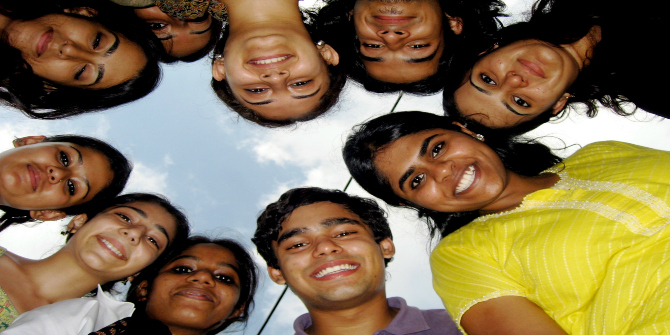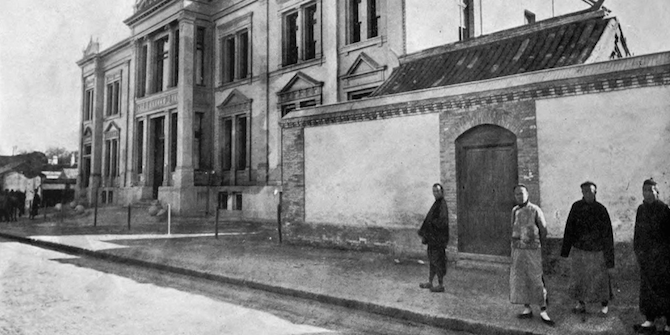 Holes in The Whole seeks meaning and reasons for the existence of the city. Krzysztof Nawratek discusses the urgent need to expand the sphere of urban activity – to define the city not only as a territory of exploitation, but as space of human existence in its fullest dimension. Treating the city as primarily a political entity to be re-invented offers a welcome contrast to much urban analysis that takes for granted and fails to challenge dominant forms of political economy, writes Karl Baker.
Holes in The Whole seeks meaning and reasons for the existence of the city. Krzysztof Nawratek discusses the urgent need to expand the sphere of urban activity – to define the city not only as a territory of exploitation, but as space of human existence in its fullest dimension. Treating the city as primarily a political entity to be re-invented offers a welcome contrast to much urban analysis that takes for granted and fails to challenge dominant forms of political economy, writes Karl Baker.
 Holes in the Whole: Introduction to the Urban Revolutions. Krzysztof Nawratek. Zero Books.
Holes in the Whole: Introduction to the Urban Revolutions. Krzysztof Nawratek. Zero Books.
Celebratory accounts of the city are not in short supply. Ed Glaeser’s Triumph of the City, Richard Florida’s Cities and the Creative Class, Leo Hollis’ Cities are Good for You, and even recent World Bank reports are all enthusiastic about our rapidly urbanising world. In the boldest proclamations cities are ‘our greatest invention’, making us ‘richer, smarter, greener, healthier, and happier’ (the subtitle of Glaeser’s book).
Krzysztof Nawratek is rightly suspicious of this kind of hype, and an honest assessment of the current state of urban life suggests that cities in their current form require plenty more inventive work to offer their inhabitants truly rewarding lives. But if Nawratek is more critical of the contemporary state of the urban – “cities are not alright” – he shares a conviction with Glaeser and the like that cities do matter.
Cities matter for Nawratek not because they offer a superior geography for innovation and economic growth, nor because they provide the bistros, piazzas and lifestyle that lure the creative class. Rather, cities are at the centre of something more fundamental; the promise of an ‘urban revolution’: a re-organisation of political life to “allow the restoration of the city’s subjectivity”. Treating the city as primarily a political entity to be re-invented offers a welcome contrast to much urban analysis that takes for granted and fails to challenge dominant forms of political economy.
Central to the book’s argument is the importance of a city-based ‘institution/ border’ that mediates between the ‘subject’ or ‘inside’ of the city and a global ‘outside’. The weakness of contemporary cities is that “they no longer decide their own fate and have instead become a resource of space, buildings, infrastructure and people … utilised by phenomena transcendent to cities – mainly global corporations”. The institution/ border then establishes a mechanism by which the city as political community might ‘contaminate’ or regulate free-ranging flows of global capital with the objective of ‘self-managing’ relations with a wider world.
This argument about loss of agency in a globalising world is a familiar one, and in applying the idea to cities rather than nations Nawratek presents a striking metaphor of the passive ‘princess city’ awaiting its multinational prince to bring it to life. If cities are to cast off this passivity and claim initiative in a context of feral globalisation, Nawratek does not advocate a defensive and inward form of ‘community’ as the foundation for a city-based polity. Dismissing attempts to create ‘strong local communities’ as the dangerous yearnings of “leftist utopians and rightist communitarians”, he nevertheless proposes a compelling notion of ‘intimate tenderness’ that binds people in a non-possessive relationship with local place. He also argues that a coherent ‘whole-ness’ to the urban political community is a vital condition for successful civic institutions. The city has today “lost its physical boundary with the exterior. Instead it has countless and ever growing number of internal boundaries”.
These contemporary ‘holes’ in the ‘whole’ of the city (as the book’s title suggests) are problematic for Nawratek. However, there is an uneasy tension between overcoming internal urban divisions to ensure an effective bulwark against rampant global capital flows and at the same time allowing for ‘internal differentiation’. The book rejects constructing the city around a ‘common good’ (it doesn’t exist), and instead imagines the institution allowing ‘fragments’ of the city to somehow coalesce into a ‘subject’. Positioning ‘wholeness’ as the guiding concept for a politics of diverse and globalised cities is a bold move, and imaginations of urban political forms that prioritise the extensive global relationships between cities (rather than the city as coherent individualised agent) may also be interesting to explore.
In line with much critical geographic and spatial theory, Holes in the Whole presents a looming ‘neoliberal capitalism’ as the current ‘not alright’ context from which an alternative must emerge. At times, Nawratek’s alternative is as difficult to grasp as the vast abstraction of ‘global capitalism’ itself – and what is offered is a heavily theoretical study of what a new form of city-centred politics might entail. Precisely how the new political institutions might function is left open, and there are few references to real-world models that might align with Nawratek’s vision. He briefly approves of recent experiences in South American cities – pointing out that successes in Curitiba or Bogota are the result of strongly empowered city-based political institutions, not the neoliberal loosening up of capital flows. Whether British cities would pass his test for ‘self-management’ is highly unlikely, with the Thatcher legacy of weakened London governance seemingly vindicating the thesis that neoliberalism goes hand in hand with diminished city-based institutions.
Nawratek’s book is a bold polemic with revolutionary ambitions and should not be expected to provide precise guidelines for empowering cities as political entities. Nevertheless, it prompts inquiry into the practical steps ahead for urban governance. Looking to thinkers from a more reformist position reveals some of the practical complexities of empowering cities. Gerald Frug’s work, for instance, suggests that the most immediate tasks for city empowerment concern reform of the legal powers conferred to cities by more dominant nation states. Changing laws to give cities increased revenue-raising power and control over basic infrastructure such as transport or educational systems is hardly revolutionary, but still requires considerable overhaul of existing political frameworks. While this is the mundane work of institutional reform, there may be ways in which it complements the wider ambitions of Nawratek’s ‘urban revolution’.
Holes in the Whole is a welcome contribution to an increasingly crowded field of writing on cities. It is a short but always stimulating read, provoking questions and offering flashes of insight. In fighting against urban politics that is too often captured by the “totalitarian logic of profit”, the book prompts much needed thinking about how to construct progressive political institutions that empower both cities and their citizens.
———————————————————
Karl Baker is a Researcher at LSE Cities, at the London School of Economics and Political Science. Karl recently graduated from the MSc City Design and Social Science programme at the LSE. He also holds a BA (Hons) in Political Science from Victoria University, Wellington. He has previously worked as a policy adviser for New Zealand’s Ministry of Transport where he advised governments on priorities for transport infrastructure investment. He has worked on improving project evaluation methods to better understand the impact of transport infrastructure on the social, environmental and economic performance of cities. Read more reviews by Karl.








2 Comments